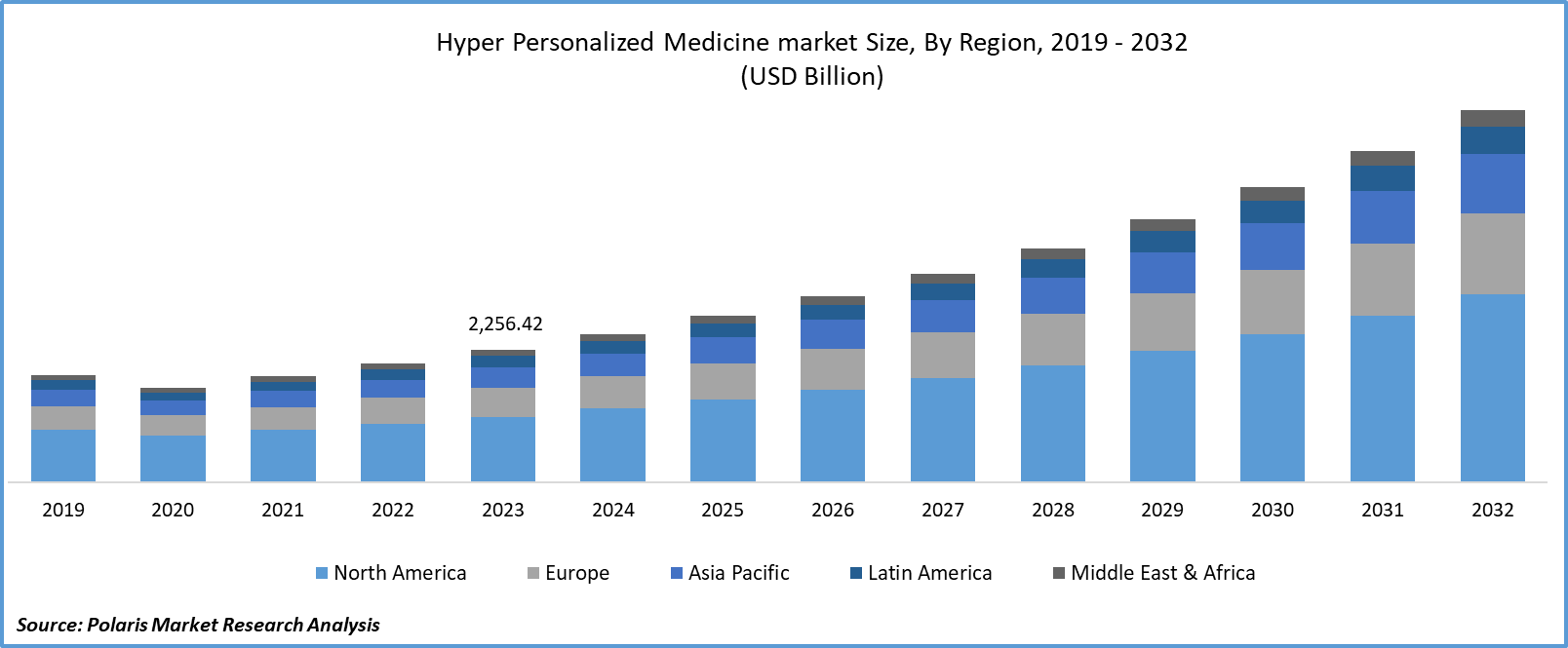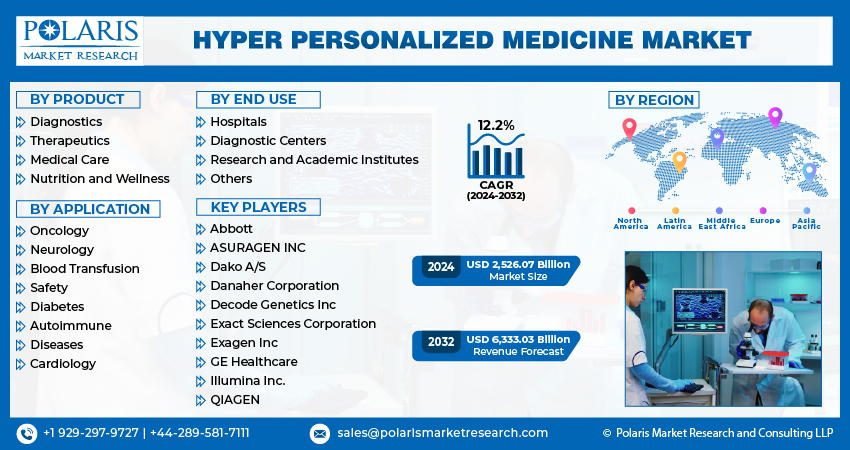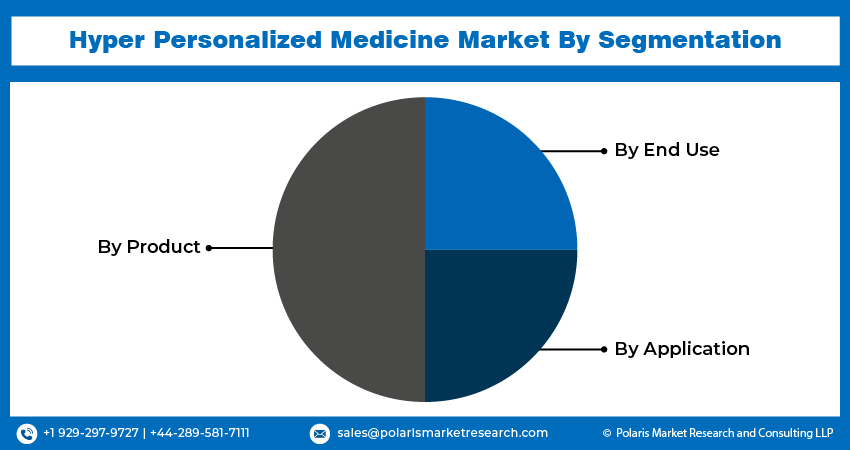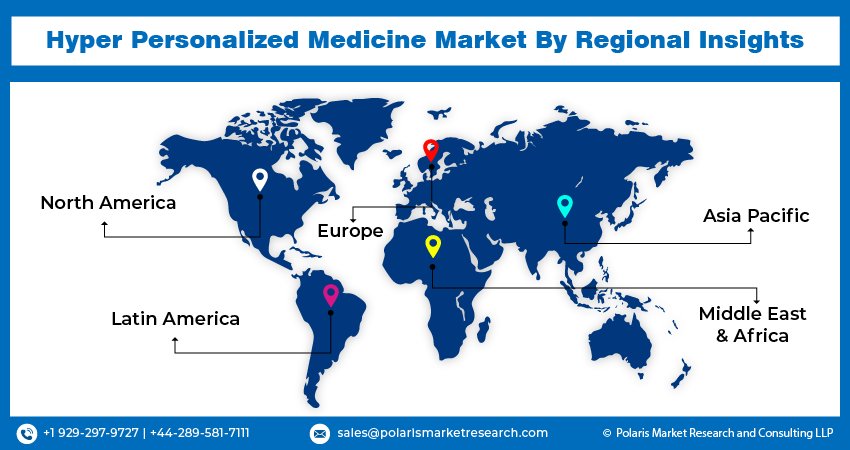
Hyper Personalized Medicine Market Share, Size, Trends, Industry Analysis Report
By Product (Diagnostics, Therapeutics, Medical Care, Nutrition and Wellness); By Application; By End Use; By Region; Segment Forecast, 2024 - 2032
- Published Date:Feb-2024
- Pages: 116
- Format: PDF
- Report ID: PM4601
- Base Year: 2023
- Historical Data: 2019 – 2022
Report Outlook
Global hyper personalized medicine market size was valued at USD 2,256.42 billion in 2023. The market is anticipated to grow from USD 2,526.07 billion in 2024 to USD 6,333.03 billion by 2032, exhibiting the CAGR of 12.2% during the forecast period.
Market Overview
Hyper personalized medicine market involves creating highly individualized treatment plans based on an individual's unique genetic makeup, lifestyle, environment, and other factors. This approach goes beyond the one-size-fits-all model to deliver targeted and optimized medical interventions. The market synopsis includes the use of genomic information to understand an individual's genetic profile. Genetic data is utilized to predict disease susceptibility, identify potential treatment responses, and personalize drug regimens for better efficacy and reduced side effects.
Hyper-personalized medicine involves advanced diagnostic techniques that provide detailed insights into an individual's health status. This may include hyper-personalized medicine diagnostics, advanced imaging technologies, and other diagnostic tools that contribute to a comprehensive understanding of a patient's condition.

To Understand More About this Research: Request a Free Sample Report
The rising number of studies exploring the significance of precision medicine and the growing adoption of technological advancements are anticipated to showcase new potential hyper-personalized medicine market opportunities. The study published in Gynecologic Oncology developed a new model with artificial intelligence and machine learning to determine early-stage ovarian cancer. The model showcased 93% accuracy, which can be used to offer personalized medication. In addition, rising studies on the diagnosis of certain diseases are anticipated to facilitate new opportunities for the hyper-personalized medicine market.
- For instance, in May 2020, a study published by Frontiers organization in Nature Genetics focused on the development of a statistical tool to identify genetic variants in patients easily and quickly with the utilization of data from genome-wide association studies and the prediction of genetic expression.
Moreover, personalized medicine assists people in checking their genetics to monitor the potential risk of cancer in their family by observing genetics, helping people to take precautions in the early stages. The rising collaborative initiatives in the global space are further boosting the scope of the hyper-personalized medicine market. For instance, in November 2023, the Institute for Systems Biology entered a collaborative framework with NED Biosystems to reduce the incidence of cancer.
However, the higher costs of adoption and lower availability of hyper-personalized medicine, as it is in an emerging stage in the healthcare sector, are likely to hamper hyper-personalized medicine market growth during the study period.

Growth Drivers
Rising genetic studies to cure ongoing health problems
The rising focus on genetic studies to address ongoing health problems serves as a significant hyper personalized medicine market growth driver. Genetic studies provide valuable insights into the genetic makeup of individuals, allowing for a deeper understanding of the genetic basis of various health conditions. This knowledge contributes to uncovering the genetic factors associated with diseases, including their causes, progression, and susceptibility.
These studies help identify specific genetic biomarkers associated with particular diseases or conditions. These biomarkers serve as indicators that can be used for early disease detection, risk assessment, and personalized treatment planning. By analyzing genetic data, healthcare professionals can predict an individual's susceptibility to certain health conditions. This enables the development of personalized preventive strategies and interventions to mitigate the risk of developing specific diseases.
The rising adoption of advanced technologies
The rising adoption of advanced technologies serves as a significant growth driver in the hyper personalized medicine Market. The advent of high-throughput genomic sequencing technologies, such as next-generation sequencing (NGS), has revolutionized genetic analysis. These technologies enable the rapid and cost-effective sequencing of an individual's entire genome, facilitating comprehensive genomic profiling for personalized medicine applications.
The integration of big data analytics allows for the processing and analysis of vast amounts of genetic, clinical, and healthcare data. Advanced analytics tools can identify patterns, correlations, and associations within these datasets, providing valuable insights into disease mechanisms, treatment responses, and patient outcomes. Advanced diagnostic technologies, including molecular diagnostics, proteomics, and metabolomics, contribute to precision diagnostics. These techniques enable the detailed analysis of molecular and biochemical markers, aiding in the identification and characterization of diseases at a molecular level.
Restraining Factors
Lower awareness and accessibility of hyper-personalized medicine
The need for more awareness about the effectiveness and ability of hyper-personalized medicines, along with the rising concerns about data privacy in the marketplace, is likely to restrain the growth of the global hyper personalized medicine market, as it can lower the demand for this type of treatment. In addition, the resistance to adopting advanced healthcare models among healthcare providers is anticipated to have a negative impact in the coming years.
Report Segmentation
The market is primarily segmented based on product, application, end use and region.
|
By Product |
By Application |
By End Use |
By Region |
|
|
|
|
To Understand the Scope of this Report: Speak to Analyst
By Product Analysis
Therapeutics segment is projected to witness the highest CAGR during the forecast period.
The therapeutics segment is projected to witness the highest CAGR during the forecast period, primarily attributable to the rising development of precision hyper-personalized medicine therapeutics with the incorporation of advanced technologies. The rising innovations in oncology are projected to boost the growth of the global hyper personalized medicine market size.
The hyper-personalized medical segment led the market highlights with a substantial revenue share in 2023. This is largely attributable to the significant uptick in demand for early detection of chronic diseases due to the prevalence of cancer, diabetes, genetic disorders, and autoimmune diseases in the population. This trend is promoting the development of personalized diagnostics in the marketplace and raising the market value in upcoming years.
By Application Analysis
Oncology segment accounted for the largest market share in 2023
In 2023, the oncology segment accounted for the largest hyper personalized medicine market share. This can be explained by the existence of oncology drugs that performed well in some genetics studies, contributing to the evaluation of studies exploring genetics. A study conducted by researchers at Hokkaido University innovated the cancer-grade probing system to determine tumor malignancy among patients without invasion.
The neurology segment is expected to grow at the optimal rate over the next few years on account of the rapid increase in the number of research institutions focusing on tackling neurological disorders with genomic sequencing. A study published in Neurology Genetics developed the machine learning model for polygenic risk scores to enhance the prediction performance of Alzheimer's disease endophenotypes.
By End-Use Analysis
The hospital's segment accounted for a significant revenue share in 2023
The hospitals segment accounted for the significant revenue share in 2023, due to the continuous rise in patient intake and the growing adoption of technological innovations. Healthcare providers are showing profound interest in adopting predictive modeling with patient-centric data to promote their treatment efficiency in the marketplace.
The diagnostic segment is projected to witness reasonable growth in the global market, driven by the rising number of people approaching diagnostic centers for personalized medication due to its potential to determine diseases and risk assessment accurately.

Regional Insights
North America region held the largest market share in 2023
In 2023, the North American region held the largest market share. The region's growth is due to the rising shortage of healthcare professionals, which is propelling the expansion of the global market. According to the projections of the American Medical Colleges Association, there will be a need for physicians between 37,800 & 124,000 by 2034 in the United States.
Asia Pacific region is expected to witness the fastest-growing CAGR during the projected period.
The Asia Pacific region is expected to witness the fastest-growing region with a prominent CAGR during the projected period, owing to the presence of a larger population necessitating an efficient healthcare system. The rising incidence of chronic diseases in the region is expected to drive the adoption of hyper-personalized medicine. According to the study published in the Indian Council of Medical Research, the prevalence of cancer cases in India is expected to rise from 14.6 lakhs in 2022 to 15.7 lakhs by 2025. This pattern is expected to boost the adoption of precision treatment in the region.

Key Market Players & Competitive Insights
Rising innovations to drive the competition
The hyper-personalized medicine market analysis is fragmented and is anticipated to witness competition due to several players' presence. The growing innovations and wider range of applications of hyper-personalized medicine in academic research, healthcare, and pharmaceuticals are playing a vital role in promoting market application expansion.
Some of the major players operating in the global market include:
- Abbott
- ASURAGEN INC
- Dako A/S
- Danaher Corporation
- Decode Genetics Inc
- Exact Sciences Corporation
- Exagen Inc
- GE Healthcare
- Illumina Inc.
- QIAGEN
Recent Developments in the Industry
- In November 2023, a study conducted by scientists at DECODE Genetics explored the presence of actionable genes that cause diseases in the Icelandic population and concluded that 1 in 25 people has actionable genes, and having this genotype is negatively associated with a lower lifespan.
- In January 2024, Abbott announced that it had received U.S. Food and Drug Administration approval to introduce a rechargeable deep brain stimulation (DBS) device, the Liberta RC DBS system, to treat movement disorder patients.
Report Coverage
The hyper personalized medicine market report emphasizes on key regions across the globe to provide better understanding of the product to the uses. Also, the report provides market insights into recent developments, trends and analyzes the technologies that are gaining traction around the globe. Furthermore, the report covers in-depth qualitative analysis pertaining to various paradigm shifts associated with the transformation of these solutions.
The report provides detailed analysis of the market while focusing on various key aspects such as competitive analysis, product, application, end use and their futuristic growth opportunities.
Hyper Personalized Medicine Market Report Scope
|
Report Attributes |
Details |
|
Market size value in 2024 |
USD 2,526.07 billion |
|
Revenue forecast in 2032 |
USD 6,333.03 billion |
|
CAGR |
12.2% from 2024 – 2032 |
|
Base year |
2023 |
|
Historical data |
2019 – 2022 |
|
Forecast period |
2024 – 2032 |
|
Quantitative units |
Revenue in USD billion and CAGR from 2024 to 2032 |
|
Segments covered |
|
|
Regional scope |
|
|
Competitive Landscape |
|
|
Report Format |
|
|
Customization |
Report customization as per your requirements with respect to countries, region and segmentation. |
FAQ's
The Hyper Personalized Medicine Market report covering key segments are product, application, end use and region.
Hyper Personalized Medicine Market Size Worth $6,333.03 Trillion By 2032
Hyper Personalized Medicine Market exhibiting the CAGR of 12.2% during the forecast period.
North America is leading the global market
key driving factors in Hyper Personalized Medicine Market are Rising genetic studies to cure ongoing health problems
